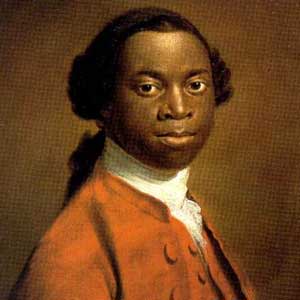Olaudah Equiano: Who was the African author whose autobiography exposed the realities of the slave trade?

Google’s latest Doodle marks what would have been the 272nd birthday of Olaudah Equiano (1746-1797), the African writer whose memoir gave the world one of its first accounts of the slave trade from a victim's perspective.
The Interesting Narrative of the Life of Olaudah Equiano or Gustavus Vassa, the African was published in 1789 (the second part of its title alluding to Equiano’s slave name) and immediately became a sensation.
The work played a huge role in alerting eighteenth century audiences to the suffering endured by those uprooted from their homelands to serve white masters and bolstered the abolitionist cause, inspiring William Wilberforce, Granville Sharp and their fellow campaigners to draft the Slave Trade Act of 1807, which would ultimately force an end to human trafficking across the British Empire.
Equiano became a rich man and the work is still read and revered to this day as a masterpiece of the colonial period.
He was born on 16 October 1746 in Essaka in the Eboe province of southern Nigeria (later in life his place of birth was given as South Carolina, confusing the issue somewhat). According to the man himself, slave traders abducted Olaudah and his sister at the age of 11 and shipped them to Barbados with 244 other captives before they were moved on again to Virginia (at that point still a British colony).
In America, Equiano was sold to Lieutenant Michael Pascal, a Royal Navy officer, who renamed him “Gustavus Vassa” after the sixteenth century king of Sweden, Gustav I. Pascal was comparatively kind to Equiano – although the boy’s insistence on being addressed as Jacob “gained me many a cuff” - and gave him a genteel education, inviting his sister-in-law to teach Olaudah to read and write and having him baptised during their eight-year association, largely spent sailing the seas.
This included a stint at Pascal's side during the Seven Years’ War with France, when Equiano was employed to haul gunpowder to the decks to support cannon-fire during sea battles.
By 1765, Olaudah was sold on to London ship’s captain James Doran, who set sail for Montserrat aboard the Charming Sally, where he was traded again, this time to Robert King, a well-to-do Quaker merchant from Philadelphia.
Olaudah served as King’s valet, deckhand and even barber and was allowed to earn money by making deals of his own. This concession, crucially, enabled Equiano to buy his freedom from King through funds accumulated from the sale of fruit, drinking glasses and other goods three years later. King urged him to stay on as a business partner in the West Indies but Equiano feared recapture following a close call in Georgia.
He spent the next 20 years travelling the world, visiting places as exotic as Turkey, Central America’s Mosquito Coast and the Arctic, eventually settling in London, campaigning for abolition with his fellow “Sons of Africa” and writing the best-seller that would bring him international fame.
Freedom proved difficult to adjust to and Equiano confessed to entertaining suicidal thoughts, before finding solace through his Methodist faith and marriage to English wife Susannah Cullen, with whom he had two daughters. The family lived in Soham, Cambridgeshire, where he died in 1797, his legacy assured.

 Yahoo News
Yahoo News 